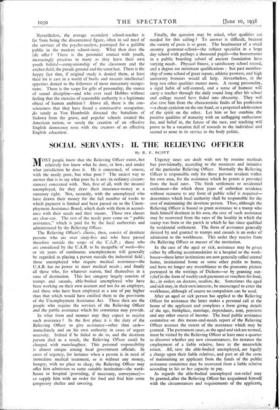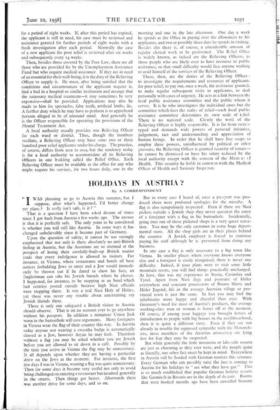SOCIAL SERVANTS : II. THE RELIEVLNG OFFICER
By R. F. SCOTT
MOST people know that the Relieving Officer exists, but relatively few know what he does, or how, and under what jurisdiction he does it. He is concerned, of course, with the needy poor, but what poor ? The easiest way to answer that is to say what poor he is not (in ordinary circum- stances) concerned with. Not, first of all, with the insured unemployed, for they draw their insurance-money as a statutory right. Not, secondly, with the unemployed who have drawn their money for the full number of weeks to which payment is limited and been passed on to the Unem- ployment Assistance Board, which deals with them in accord- ance with their needs and their means. Those two classes are clear-cut. The rest of the needy poor come on " public assistance," which is paid for by the local authorities and administered by the Relieving Officer.
The Relieving Officer's clients, then, consist of destitute persons who are over sixty-five and who have passed therefore outside the scope of the U.A.B. ; those who are considered by the U.A.B. to be incapable of work—five or six years of continuous unemployment will generally be regarded as placing a person outside the industrial field ; those unemployed who require medical assistance—the U.A.B. has no power to meet medical needs ; and finally all those who, for whatever reason, find themselves in a state of destitution. This last category largely consists of tramps and casuals, able-bodied unemployed who have been working on their own account and not for an employer, and those who have been employed at a rate of pay higher than that which would have entitled them to the provisions of the Unemployment Assistance Act. These then are the people who require the services of the Relieving Officer and the public assistance which his committee may provide.
In what form and manner may they expect to receive such assistance ? In the first place it is the duty of the Relieving Officer to give assistance—other than cash— immediately and on his own authority in cases of urgent necessity. Indeed if he failed to do so, and the destitute person died as a result, the Relieving Officer could be charged with manslaughter. This personal responsibility is almost unique among local government officials. In cases of urgency, for instance when a person is in need of immediate medical treatment, or is without any money, hungry, with no place to sleep, the Relieving Officer may offer him admission to some suitable institution—the work- house or hospital (providing, if necessary, conveyance)— or supply him with an order for food. and find him some temporary shelter and covering. Urgency cases are dealt with not by routine methods but provisionally, according to the resources and initiative of the particular Relieving Officer. Normally the Relieving Officer is responsible only for those persons resident within his own area, for the assistance which he grants is provided from the local rates. The birth settlement or residential settlement—for which three years of unbroken residence without recourse to any form of public relief is required— determines which local authority shall be responsible for: the cost of maintaining the destitute person. Thus, although the Relieving Officer is bound to grant assistance to a tramp who finds himself destitute in his area, the cost of such assistance may be recovered from the rates of the locality in which the tramp was born or the parish in which he has since qualified by residential settlement. The form of assistance generally desired by and granted to tramps and casuals is an order of admission to the workhouse. This order they receive from the Relieving Officer or master of the institution.
In the case of the aged or sick, assistance may be given either by offering accommodation in a hospital or the work- house—these latter institutions are now generally- called central home, institutional home or some other prefix to home, and have no longer any resemblance to the gruesome picture portrayed in the writings of Dickens—or by granting out- relief in the form of weekly cash payments or vouchers for food, &c., in orders on doctors, oculists, &c. Sometimes the aged and sick may, in their own interests, be encouraged to enter the workhouse, although of course no compulsion can be used.
After an aged or sick person has applied to the Relieving Officer for assistance the latter makes a personal call at the home of the applicant and completes a form giving details of the age, birthplace, marriage, dependants, rent, pensions and any other source of income. The local public assistance committee on this means-and-needs report of the Relieving Officer assesses the extent of the assistance which may be granted. The permanent cases, as the aged and sick are termed, must be visited by the Relieving Officer at least once a quarter to discover whether any new circumstances, for instance the employment of a liable relative, have in the meanwhile arisen. All, save the able-bodied unemployed, are legally a charge upon their liable relatives, and part or all the costs of maintaining an applicant from the funds of the public assistance committee may be recovered from a liable relative according to his or her capacity to pay.
As regards the able-bodied unemployed out-relief may be granted, after the Relieving Officer has acquainted himself with the circumstances and requirements of the applicant, for a period of eight weeks. If, after this period has expired, the applicant is still in need, his case must be reviewed and assistance granted for further periods of eight weeks with a fresh investigation after each period. Normally the case of a new applicant for poor relief is reviewed after six weeks and subsequently every 14 weeks.
Then, besides those covered by the Poor Law, there are all those who are provided for by the Unemployment Assistance Fund but who require medical assistance. If they are in need of an essential for their well-being, it is the duty of the Relieving Officer to supply it. He must, after being satisfied that the conditions and circumstances of the applicant require it, find a bed in a hospital or similar institution and arrange that the necessary medical treatment—it may sometimes be very expensive—shall be provided. Applications may also be made to him for spectacles, false teeth, artificial limbs, &c. A further duty which he may have to perform is to apprehend persons alleged to be of unsound mind. And generally he is the Officer responsible for operating the provisions of the Mental Treatment Act.
A local authority usually provides one Relieving Officer for each ward or district. Thus, though the numbers oscillate, a Relieving Officer may have some two or three hundred poor relief applicants under his charge. The practice, of course, differs from area to area, but the tendency today is for a local authority to accommodate all its Relieving Officers in one building called the Relief Office. Each Relieving Officer must be available at the office for any who might require his services, for two hours daily, one in the morning and one in the late afternoon. One day a week he spends at the Office in paying over the allowances to his applicants, and two or possibly three days he spends in visiting. Besides this there is, of course, a considerable amount of regular clerical work to be performed. The Relief Office is widely known, as indeed are the Relieving Officers, to those people who are likely ever to have recourse to public assistance, so that small difficulty would face anyone wishing to avail himself of the services of the Relieving Officer.
These, then, are the duties of the Relieving Officer : to investigate the requirements and resources of applicants for poor relief, to pay out, once a week, the assistance granted, to make regular subsequent visits to applicants, to deal personally with cases of urgency. He acts as a link between the local public assistance committee and the public whom it serves. It is he who investigates the individual cases but the committee which fixes the scales of relief—each local public assistance committee determines its own scale of relief. There is no national scale. Clearly the work of the Relieving Officer is highly responsible. It is far from stere 3- typed and demands wide powers of personal initiative, judgement, tact and understanding and appreciation of human beings. In order that he shall have free scope to employ these powers, uninfluenced by political or other pressure, the Relieving Officer is granted security of tenure— he cannot be dismissed or have his salary reduced by the local authority except with the consent of the Minis er c f Health. This security he holds in common with the Medical Officer of Health and Sanitary Inspector.











































 Previous page
Previous page